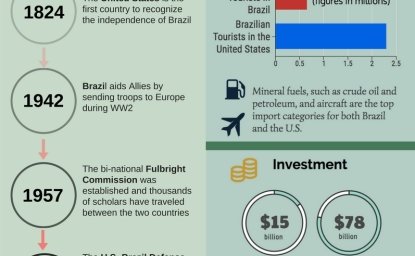A joint-venture agreement struck between United States aerospace giant Boeing and its Brazilian counterpart Embraer represents a potential early success for Brazil–U.S. collaboration, amid high hopes for the bilateral relationship as Jair Bolsonaro’s administration is set to take office in January. Under the $4.2 billion deal, announced by both companies on December 17, Boeing will acquire 80 percent ownership of the commercial and services division of Embraer. Reflecting Embraer’s history as a state-owned enterprise (it was privatized in 1994, with the government retaining a “golden share”), the deal will require approval from Brasilia. Both the government and the Brazilian Air Force, which created Embraer in the late 1960s, have expressed goodwill for the project. An approved deal may serve as an early gauge of the Bolsonaro administration’s seriousness about promoting business collaboration between American and Brazilian industry. The defense division of Embraer is excluded from the terms of the announced deal, but the companies have also said they agreed to form a joint venture to commercialize and service Embraer’s new KC-390 military transport aircraft. In this case, Embraer will keep a 51 percent stake and Boeing the remaining 49 percent. The exact terms of the KC-390 joint venture have not been released yet, but there are signals the collaboration could be more extensive than under similar pacts between the two companies in 2012 and 2014 for assistance in developing the aircraft. The deal draws American and Brazilian aviation industry even closer together. Embraer already operates an assembly plant in Melbourne, Florida, and the deal is likely to make greater collaboration between the two companies on defense possible going forward, including the possibility of US future purchase of KC-390 aircraft. News of the Boeing–Embraer partnership will reinforce expectations of a friendlier climate for international business in Brazil under Bolsonaro and his pro-business minister of the Economy, Paulo Guedes. While the Boeing–Embraer joint venture pertains strictly to business rather than governmental collaboration, it represents an encouraging sign for cooperation between companies from two countries, which have faced obstacles in the past. Notably, the deal could foster a propitious environment for the revival of an agreement signed in the early 2000s between the two governments on the use of Alcântara, a fuel-saving space launching center located in Brazil’s Northeast, near the Equator. An agreement on the use of Alcântara by American companies, signed by the administrations of presidents Bill Clinton and Fernando Henrique Cardoso in 2002, was rebuffed the following year by Cardoso’s successor, Luiz Inácio Lula da Silva, and floundered in the Brazilian Congress. Brazil proposed reopening the negotiations in 2016. The incoming minister of Science and Technology Marcos Pontes, recently voiced support for an Alcântara deal, stating the possibility of American use of the base “does not threaten national sovereignty in any way.”
Image: KC-390 Força Aérea Brasileira Photostream (CC BY-NC-SA 2.0), via Flickr






